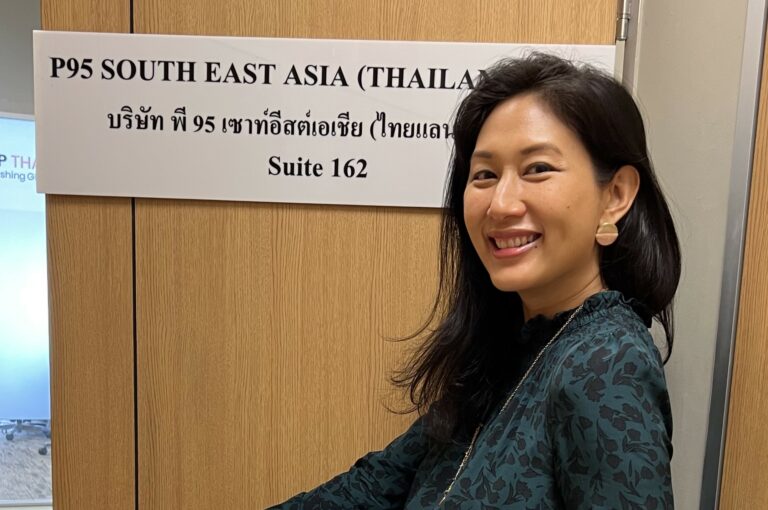Official Opening of P95 Thailand

Almost two years after expanding its operations to Latin America with the creation of P95 Latina, our company has announced the creation of a new branch office in South East Asia (SEA) based in Thailand. In this interview, Tharinee Sakhakorn, Regional Director for SEA shares a bit more about the experience of setting up this subsidiary, the main challenges of the process and the objectives and reasons to choose Thailand as the main hub for the office.
Please tell us about your background and how you came to meet P95.
Tharinee Sakhakorn: I joined the pharmaceutical industry almost 20 years ago and was very fortunate to have the opportunity to bring an international component to my career. I have had a variety of roles in research and development at the global, regional and country levels, including project management, training, quality risk management, change management and strategic leadership. I worked for GSK Vaccines (Thailand and Belgium), Takeda Vaccines (Switzerland), Roche (Thailand) and Clover Biopharmaceuticals prior to joining P95 as a Regional Director for SEA.
I am passionate about developing talent, transforming and leading the growth of the business. So, when I heard about P95’s potential expansion to SEA, I was very motivated by the opportunity to make an impact on the organization and contribute meaningfully to the region.
How has the process of setting up the subsidiary been? What have the main challenges been?
TS: It is generally quite easy to set up a company in Thailand as a Thai Limited Company. However, we have made the decision to get P95 SEA registered to the Board of Investment (BOI) as a Contract Research Organization (CRO), which is a little complex and time-consuming. It involves compiling a variety of corporate documents and supporting materials, including a detailed business plan and financial plan. Our application was accepted in the first round and our interview with the BOI officials went quite smoothly (thanks to our CEO Thomas Verstraeten’s detailed explanation of our services to help the BOI understand what P95 has to offer).
The main challenges have been following through different steps, getting the required documents together and ensuring that we are fulfilling different criteria for BOI and the Department of Business Development (DBD) to be fully operational.
What was the reason to choose Thailand as the main hub for the SEA region? What is the landscape of epidemiology and research in this country?
TS: We looked at three factors when assessing the entity location for P95 SEA, including the research landscape, the talent pool and the business environment.
Thailand has a high incidence of tropical diseases, including dengue fever, hepatitis, malaria, Japanese encephalitis and rabies. Among the SEA countries, Thailand has the highest number of studies listed on ClinicalTrials.gov (more than 3,200 studies and about 530 of these are observational) and the highest number of publications on epidemiology.
Thailand has a significant presence of research units with foreign collaborations, international pharmaceutical companies and CROs. Epidemiology experience is mainly found in academic and post-graduate settings, but is still quite limited in the industry (which we saw as an opportunity). In the subject of life sciences and medicines, Thai universities are among the top 10 in SEA.
With its strategic location in the heart of mainland SEA, Thailand is well connected and safe and has long been recognized as an attractive place to live. It is an easier place to do business, and overall, it has a great potential for epidemiology research.
What are the goals for the SEA office in the short term? How about the longer term?
TS: In order to establish and grow our presence in the region, we will first focus on gaining insights and understanding the needs of the pharmaceutical industry, academia, organizations and other CROs for a complete view of our customers. We will also prioritize customer collaboration and engagement through different channels and experiences. At the same time, we aim to form and develop a high-performing team to offer project delivery excellence and high-quality execution.
Our ultimate goals are to develop a business, increase our pipeline and collaboration opportunities in the region and build bridges between regional and international epidemiological and clinical research networks that eventually support access to vaccines and medicines.